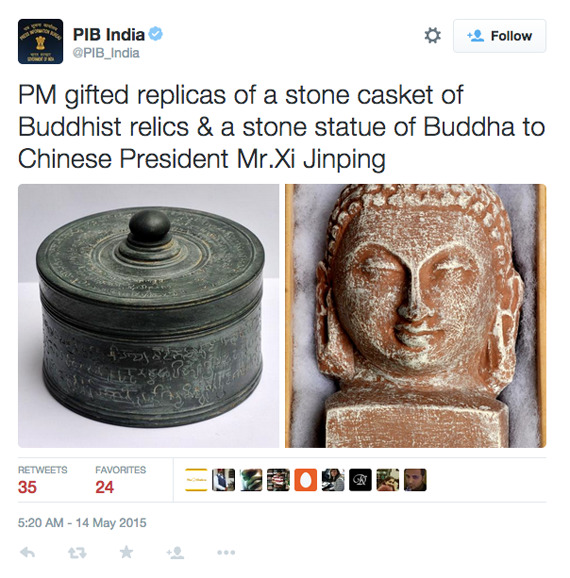
Indian Prime Minister Narendra Modi came to China bearing gifts—and Buddhist ones at that. In a visit with Chinese President Xi Jinping, Modi presented a Buddha statue and a replica casket full of relics. Optics trumped generosity, however, when the Indian government tweeted a picture of the items. The Buddha, clearly offended, shot back with 72 characters of his own: You should not praise yourself, calling attention to your good deeds. #IfOnlyHeWereOnTwitter
Prayer to the People
To observe the 70th anniversary of the division of Korea, a staggering 300,000 South Korean Buddhists assembled to pray for peace and reunification with the North. The turnout far exceeded the 50,000 American activists who, in 1967, put their meditative zeal toward levitating the Pentagon. Those absurdists failed to raise the building even the three feet granted by the police permit. But this more sincere South Korean effort may actually elevate the consciousness of local politicians who have been impeding a meaningful shift in policy, and put pressure on them to act.
Extreme Makeover, Buddhism Edition
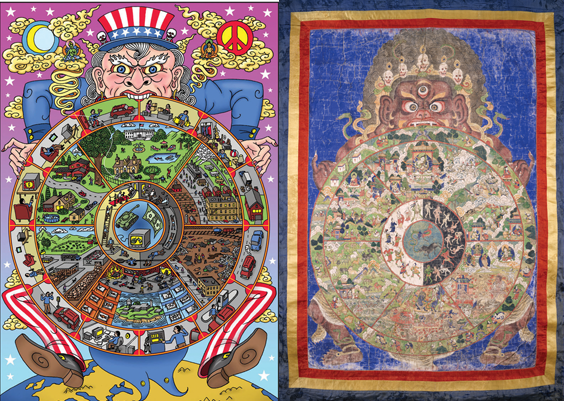
Good luck eluding Uncle Sam’s mesmerizing blue eyes and ferocious snarl in this red, white, and blue rendition of the bhavachakra (Wheel of Life), created by graphic artist and Vipassana practitioner Darrin Drda. If you can somehow escape the old man’s penetrating stare, move your glance from the center of each artwork to its outer border in order to compare the depictions of the cycle of samsara, from the three poisons to the ring of karma to the six realms to the twelve steps of dependent origination. Don’t get sucked in! Just kidding. Except for the enlightened among us, we all already are.
Books
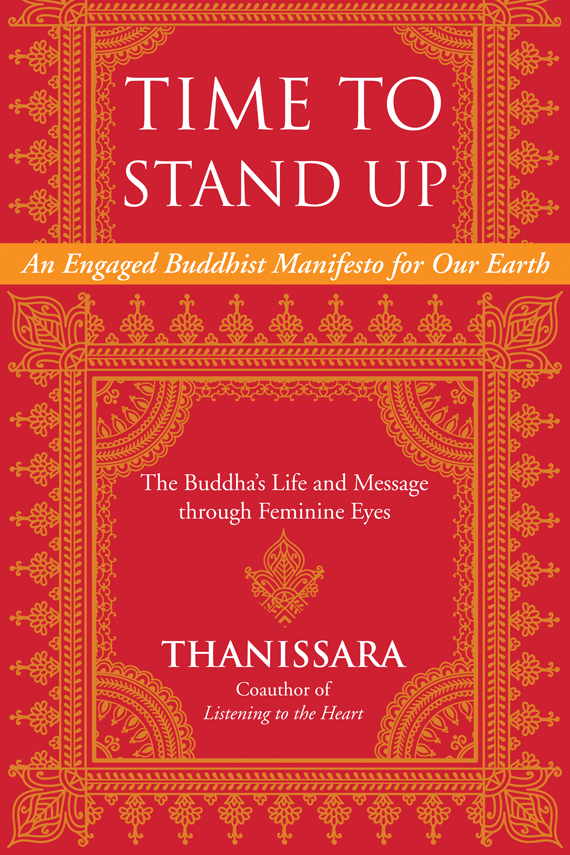
Unflinching—that’s the word that best describes Time to Stand Up, an unapologetically feminist and relentlessly inciting “engaged Buddhist manifesto” from Theravada teacher Thanissara, a former nun in the Thai Forest tradition. The book’s dedication—given not only to all nuns but also to “the kindly, wrathful, authentic, and nurturing feminine within us all”—tips off the reader to the work’s objective. More than a feminist critique of Buddhism or yet another invitation to leap off the cushion and into the streets, this declarative but supple argument entwines the two, redefining the feminine as both empathic and confrontational, then putting it forward as the salve that patriarchal Buddhism and our world-in-crisis desperately need.
Dharma, Love & Bean Cakes
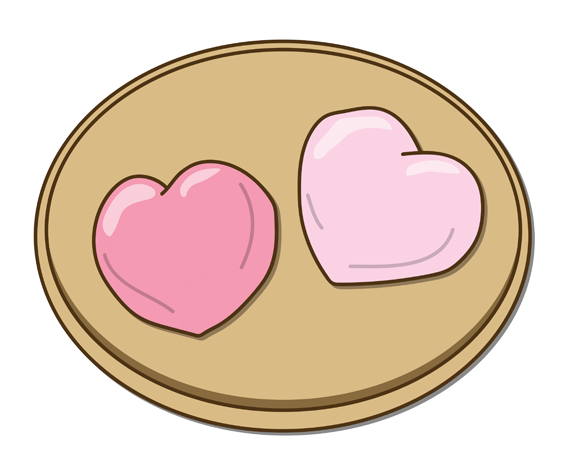
Prolonged silence is a first date’s death knell. Unless, that is, the prospective lovers aren’t permitted to speak. Such a predicament—or boon, depending on one’s gumption for the gauntlet of courtship small talk—awaits local singles who attend matchmaking events at a set of Rinzai temples in Japan, where monks lead a program of ritual meals, prayer bead stringing, and dharma talks. Concerned about the mood-killing effect of a sermon on resisting lust? Don’t fret: the temples serve heart-shaped bean cakes to offset the air of austerity.
Then again, austerity is kind of the point. If you want a fling, go to a bar. These gatherings are meant for singles looking for long-term commitment; the Japanese refer to them as konkatsu, literally translated as “marriage activities,” and loosely translated in Brooklynese as “the late twenties.”
The konkatsu events have drawn large crowds. A recent mixer brought in over 600 applications, and of the 2,600 singles who have participated since the program’s inception, 70 couples have tied the knot. In a country where many don’t meet a Buddhist priest until they attend their first funeral, the events offer temple officials a rare chance to wed young people to one of Japan’s longest-standing religious traditions.
Participants who fail to find their soulmates may instead pierce the illusory permanence behind the very concept. Or at the very least, they’ll go home with a heart-shaped bean cake.
Are You a Closet Buddhist?
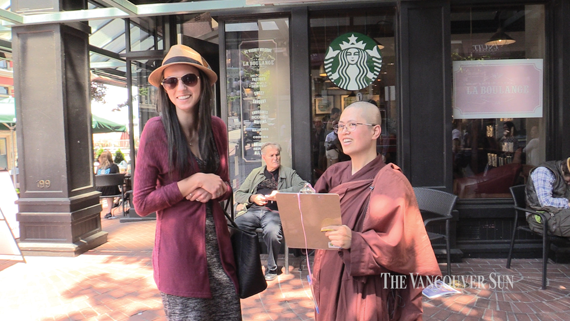
Remember that recent Starbucks PR campaign? The one that called for baristas at its American stores to initiate dialogues with customers about race? The one that spontaneously combusted in a conflagration of Internet angst? Well, a dharma-inspired phoenix rose from its ashes.
Just outside a Starbucks in Vancouver, British Columbia, a group of monks and nuns from the Bodhiyana Buddhist Education Society initiated their own series of candid conversations in May: asking passersby 10 questions to determine whether or not they were, in fact, closet Buddhists. With every “yes,” the interviewee inched one step closer to her newfound status as a bonafide Buddhist, albeit an undercover one. Imagine leaning in for your first sip of Frappuccino, then having a young brown-robed woman hit you with this metaphysical doozy: “Do you believe in taking responsibility for your own actions? That no one can absolve you from wrong doings?” Sorry, but I, uh, have an appointment . . .
Prevaricated responses aside, the campaign was a wild success—at least according to participating nun Venerable Showshir, who reported that 80 percent of respondents answered “yes” to most of her questions. “They were quite happy to find out that they were closet Buddhists,” she recalled in a video filmed by theVancouver Sun. Their elation sprang in part from positive associations with the religion but also seemed to accompany the receipt, upon completion of the quiz, of a bright yellow pin proclaiming “Proud Buddhist.”
TAKE THE QUIZ YOURSELF:
1. Have you ever done something you knew was wrong and felt as if the world punished you for it later?
2. Have you ever attended a religious celebration outside of your own religion?
3. Do you agree with the statement: “Hatred can only be cured with compassion”?
4. Have you ever thought of learning meditation?
5. Have you ever imagined who or what you were in another life?
6. Do stories of violence and tragedy ever instill a desire for world peace in you?
7. Do you think that animals have the same rights to live as humans?
8. Do you believe in taking responsibility for your own actions? That no one can absolve you from wrong doings?
9. Do you think you can change your own destiny?
10. Do you agree that your environment is a reflection of your state of mind?
Thank you for subscribing to Tricycle! As a nonprofit, we depend on readers like you to keep Buddhist teachings and practices widely available.